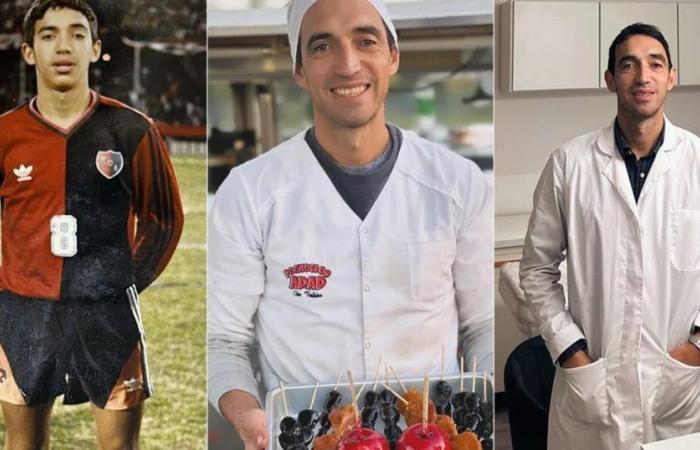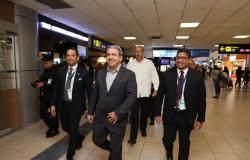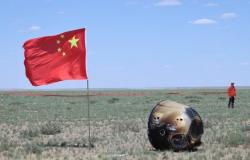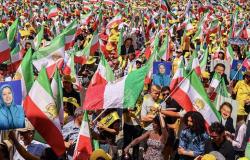
TO Julio Adad You will almost always find him in Rosario working in white. Whether with the doctor’s overalls or the overalls and apron with which he sells popcorn from a cart in the city of Santa Fe. Although he developed his addiction to soccer in some amateur tournament, he hung up his boots a while ago to focus on two of his passions: medicine and the family business.
“Julio, is that you?”a patient he had just had hip surgery on asked him in surprise when she recognized him behind the mask and cap he was wearing as he served her a bag of popcorn. The encounter was on a Sunday two years ago. The next morning he had two scheduled surgeries. When he came out of the operating room, his phone had exploded with notifications because this woman had shared a photo with him and their story went viral.
Right or central midfielder, category 81, he grew up in the humble Alvear neighborhood of Rosario and was trained in the same division as players like Maxi Rodríguez and Leonardo Ponzio. At Newell’s it was his turn to fight from behind with the team from the Youth Association of Gran Rosario. At the end of the 90s, they got her a trial at Ferro Carril Oeste (which was still in Primera), where she trained for a while until a well-known representative, who was at odds with the then president of the Leprosy Eduardo López, located him in Sarmiento de Junín along with other promising young people. “I was 18 years old and had not signed a contract, but they gave me a per diem of 600 pesos. With that money he lived and helped my parents.”he recalled.
His professional future was not projected in Junín and he returned to his payments to train at Unión de Álvarez, a managed club from which several footballers emerged who reached First Division. But when he was settling in, an international opportunity arose in Brazil: the Rio de Janeiro Americatraditional Rio team in which today Romário put his shorts back on“My dad died in November of that year. I wanted to fight to be a footballer, but I missed him a lot. I would just call on the public phone with a little card and you would get the message straight away. I was uncomfortable and a little weak. I was there for two or three months and I couldn’t stand it any longer. I was far away from everything, anxious. I came back thinking there would be something else here,” he said with the anguish that surely invaded him at that moment.
His father died waiting for a kidney transplant a month before the outbreak of December 2001. The family cart that had been moving since 1929 in Rosario as an inheritance from his great-grandfather had been left without a driver. Julio was the eldest brother of a total of four and his mother didn’t know how to drive, so she put on her captain’s belt and sold popcorn, candy, caramel apples and figs to support the family. The dream of succeeding in football was postponed, but another was born: study medicine. She met a man whom she took as a reference and discovered a new vocation. “I want to be like him,” she thought.
“I missed football and I experienced grief. At that moment you think you are old at 21 or 22 years old. I suffered a lot, I cried a lot. That’s why today I tell the kids who play that life goes on and they have to train in case they don’t make it to First Division,” he said from his perspective. In the middle of the entrance exam to study medicine, there was another inquiry to fly to Belo Horizonte due to a contact he had made in Brazil, but he was already friendly with the idea of residency and not the concentrations with campuses.
Between his college notes, his religious work schedule with the popcorn cart and the few hours of sleep, his life was summed up in one word: sacrifice. “I deprived myself of a lot of things. My old lady told me to stop, because I saw myself with the thermos of cooked mate covered with a blanket in winter studying until 3 in the morning because in the morning I would take classes or take classes, in the afternoon I would work in Parque Independencia and return at night. In summer, if it was hot, I could stay selling until 10 at night,” she revealed.
The path was not rosy and he also encountered some miseries: “I thought that ‘being someone’ at that age was having a university degree, but no. I say this today as a teacher. Many people believe that because they have a title they are more than others. Some colleagues, with their way of being, in their treatment, their ambition, in not giving you space because you are good at what you do… Because of the residency, I literally lost my daughter’s first two years. My wife had had a cesarean section and two days later I had left her alone at home to go to the hospital. She hadn’t sized anything. When I was already a traumatologist, chief resident at the hospital and had done a lot of things to get myself inserted, I felt like they didn’t value me and that they were trying to step on your head. There you click. There I realized that my mother, who did not finish high school, has more education than a person with a university degree.”
Faced with so much frustration and his mother’s request, Adad was on the verge of abandoning the race. The convincing power of a teacher who saw him well helped him stay on track: “I started to do well and the teachers encouraged me. The greatest satisfaction of having received me is that my mother sees that the effort we made together was worth it.”
After residency and Headship, he studied another four years and for six years he has been in an arthroscopy group, that is, he invested 16 years to perform knee surgeries of this type. “We make serious medicine, but it is difficult to sustain it in this country. I have colleagues who are leaving for financial reasons. I never did this for the money and I never pass a medical certificate to miss. Of course I practice medicine by vocation, do you know how many people I operated on for free? A thousand! But I have to pay the rent, the insurance, the telephone, continue training as a professional with some course… “, was the personal catharsis that she invites us to reflect.
The paradoxes of fate led him to step on the Marcelo Bielsa Colossus again. Not as a footballer, but as one of the doctors at Newell’s Reserve. And it is reflected in the kids from the quarry: “I see their faces and I notice their anxieties, that they feel the same as me. I try to advise them. I am not a sports psychologist, but I share my experience. I try to contribute my knowledge in prevention and containment. The three pillars of health are psychology, the physical part and the social part. If a leg breaks, the table will inevitably fall. There are kids who start in the club as a baby and when they get to First Division they don’t get a contract and their world collapses. That’s when you have to make them understand that life goes on even if they are not soccer players.”
Focused on his role as a street vendor, Julio also has some myths to debunk. In Rosario, half of the people call it pochoclo and the other half pororó. For him, the famous “pororó” is the red one. At the same time, he clarified that sweet popcorn is more required than salty popcorn. Caramel apple and almonds are classics that never die. But he also sells caramel figs (a historical product), peanuts and sugar candies. The cart that in his time traveled to the Argentine coast to spend time in Miramar and Mar del Plata is today installed in the Rosario Costanera area and has its permanent clientele on the banks of the Paraná River.
“Sundays with the stroller are sacred. On Saturdays my sister goes and I go to play soccer because it’s like my grounding cable. But on Sunday I prepare all the merchandise early and assemble the cart. There was a time when I did therapy because I didn’t know what was wrong with me. I realized that I was missing something and that something was being with the cart, which I had put aside to do guard duty. My wife supports me and my daughter, who is 8 years old, accompanies me when the day is nice. It’s good to do these types of things that fill you up and have feeling. There are people who come out of habit, who know that she bought from my old man or my grandfather. It is a tradition for everyone,” she remarked.
Although he always thought about specializing in traumatology to be linked to sports, his reality with the club of his loves does not depend exclusively on him. The kid that he shared practices with Fierce Rodríguez in the youth teams, traveled to Avellaneda in the box of a gas-powered F100 along with eleven other people to see the team from Tolo Gallego in 2004 and who today takes his children to the field to see Newell’s when his obligations allow it, his beacon is clear: “I would stay and live because that is where I focus my two passions, medicine and soccer. But it is very demanding in terms of responsibility and time, so the reality is that I don’t know how much longer I will be able to sustain it.”
“I don’t know Europe or the United States. I only traveled by plane once in my life to go to Buzios or to the South. Hopefully in the future I can give myself the pleasures that one idealizes, like getting to know another country. I’m 41 years old, I have experience, sometimes I think if it’s worth going crazy to generate more. My wife and I alternate working and also having a day for ourselves. I learned to say no from time to time even though it is difficult to support the family with little income and things becoming more and more expensive. And the cart thing, well, regardless of the profit, it is a feeling for me,” she describes her reality with extreme accuracy and depth.
As a university professor, he earns 120 thousand pesos per month for his ten hours of teaching per week. With the eyes of a dreamer, through the screen in the video call interview, the multitasking man does not give up in any area of life.
“What do I dream about? I dream of leaving my house and not having to put my phone inside my pants. I dream that because my children don’t have the street that I had. That when he was 8 or 9 years old he kept the money from sales in a yellow box of peanuts with chocolate in Parque Independencia. Today my daughter couldn’t do it because of insecurity. I dream of being a little more at peace in the city, for me, the most beautiful in Argentina. That would be the first of my dreams. The second, that the profession be valued a little more. That more consideration be given to those who work in medicine, a profession that is necessary and vital for a society.”, he concluded.





